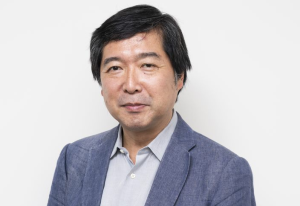[Report] Professor Yves Tiberghien and doctoral candidate Sun Ryung Park presented on Japan’s recent GX policy under the Suga and Kishida administrations, focusing on international and historical comparisons. First, Prof. Tiberghien introduced an overall picture, highlighting that the Green Industrial Revolution extends beyond environmental policy to economic security and international competition. Following this, Ms. Park presented a political economy analytical framework and discussed the GX strategy as a revial of industrial policy. Prof. Tiberghien then analyzed Japan’s recent developments, noting challenges in GX societal initiatives and the progress of EVs.
Following their presentation, Professor Hideaki Shiroyama discussed the GX strategy’s governance challenges, focusing on implementation issues such as cost and technology. He discussed Mission-Oriented Innovation Policy in the context of GX policy and revisiting industrial policies and Developmental State. This was followed by a discussion session with the entire audience.
(Shuko Nakazawa, Project Researcher, GraSPP)
—————————-
Date/time
16:00-17:30, 20th November 2023
Venue
Gallery 1, B1, Ito International Research Center, Hongo Campus, The University of Tokyo
Language
English
Host
Science, Technology and Innovation Governance (STIG) Program
Registration
https://forms.gle/sohBxuWKeopbeUZTA
Overview
A great race is now on to invent, produce, and deploy green technologies on a massive scale. The IEA October 2023 Energy Outlook noted that renewables would represent 50% of global electricity generation by 2030 (from 30% today) and electric vehicles would increase tenfold. However, this massive change comes with a major corollary. Happening without a global carbon tax, it is instead pushed by governments around the world. It has become a green industrial revolution, in which countries compete against each other for leadership. Many countries understand that the outcomes of these races will decide the competitive order of nations within two decades. This is a battle for dominance of the future economy.
For its parts, Japan has greatly accelerated its green tech policy since 2020 under Prime Minister Suga, followed by the Kishida GX strategy. How does this policy acceleration compare to strategies led by the US, China, the EU, Korea, and others in the Indo-Pacific? What are the drivers and what areas of success and current bottlenecks? In this talk, Park and Tiberghien present a comparative approach the green industrial race and locate Japanese actions and current dilemmas within this larger global race.
Short references:
• 1 November 2022: The Indo Pacific’s green industrial policy race, in East Asia Forum, with Sun Park
• April 2023. The Green Tech Race Is a Story for the Entrepreneurial State. in Filippo Fasulo, ed. The EU Indo-Pacific Bid: Sailing Through Economic and Security Competition. Milan: ISPI. Pp. 99-139. [Link to publisher], With Sun Ryung Park..
• Tiberghien, Yves. 30 January 2023: Kishida’s Climate Policy and Opportunities for U.S.-Japan Cooperation. Essay in Asia Policy 18.1
Program
16:00-16:40 Yves Tiberghien and Sun Park, “Japan’s Role in Accelerating the Green Tech Industrial Revolution and Green Industrial Policy Race”
16:40-17:00 Hideaki Shiroyama, “Issues of Governance of Green Transformation in Japan”
17:00-17:30 Discussion
Speakers
 |
Yves Tiberghien –Yves Tiberghien (Ph.D. Stanford University, 2002; Harvard Academy Scholar 2006; Fulbright Scholar 1996) is a Professor of Political Science, Director Emeritus of the Institute of Asian Research, and Konwakai Chair in Japanese Research at the University of British Columbia (UBC) in Vancouver, Canada. He is currently on study leave from UBC and Visiting Profess at the Taipei School of Economics and Political Science (2023-2024). –His research focuses on the comparative political economy of East Asia and on global economic and environmental governance. His latest book is The East Asian Covid-19 Paradox. August 2021. University Press (with post-2021 updates found here), with work forthcoming on a new book (titled Game-Changer: How Covid-19 Has Reshaped Societies and Politics in East Asia). –He is working on two other books, respectively titled Up for Grabs: Disruption, Competition, and the Remaking of the Global Order and Navigating the Age of Disruption: Options in a Shifting Global Order. |
| – | – |
 |
Sun Ryung (Sun) Park –Sun is a Ph.D. candidate in Political Science, a Liu Scholar (2021-2022) in the School of Public Policy and Global Affairs, and an IAR Fellow (2021-2023) at the Centre for Korean Studies, Institute of Asian Research, University of British Columbia. She is also a recipient of the 2023 PAFTAD (Pacific Trade and Development) Fellowships for Young Scholars, as well as the 2024 Taiwan Fellowship by the Ministry of Foreign Affairs of Taiwan. –Her research area revolves around the nexus between the state and the market in green energy sectors, with a specific focus on East Asia. Her scholarly pursuits involve a comparative analysis of the resurgence of state intervention and the revitalization of both traditional and innovative tools of industrial policy, which has been fueled by the fierce competition among states in the arena of green technology. –Sun earned her MA and BA in Political Science and International Relations at Korea University, Seoul, Korea. She is slated to continue her research at National Chengchi University, Taipei, as a visiting PhD student in the spring of 2024. |
| – | – |
 |
Hideaki Shiroyama Hideaki Shiroyama is a professor of public administration at the Graduate School of Public Policy, the Graduate School for Law and Politics and the Institute for Policy Alternatives, The University of Tokyo. He studies about global governance/ international administration, science/ technology and public policy and policy process. He was the Dean of the Graduate School of Public Policy from 2014 to 2016 and the Director of the Institute for Future Initiatives from 2021 to 2023. He was also a Visiting Scholar at MIT from 1997 to 1999 and 2023, Visiting Professor at Science Po from 2008 to 2009. He is currently working on interdisciplinary programs as the Director of Science, Technology, Innovation and Governance Program and the Coordinator of Graduate Program for Social Design and Management. |
Contact
Science, Technology, and Innovation Governance (STIG) Program
Graduate School of Public Policy, The University of Tokyo
STIG@pp.u-tokyo.ac.jp